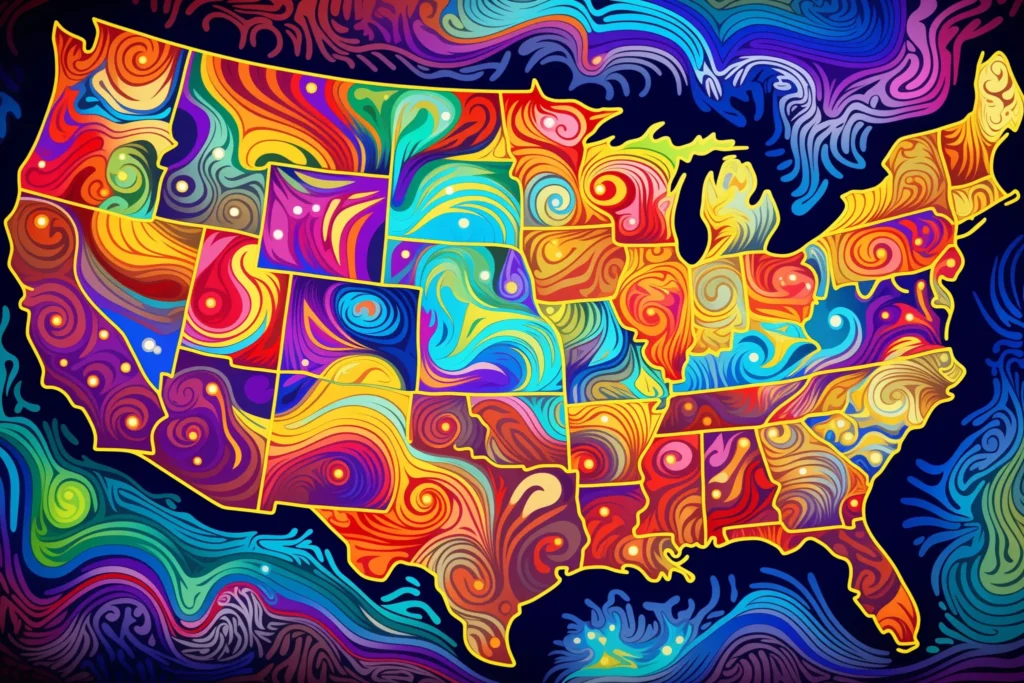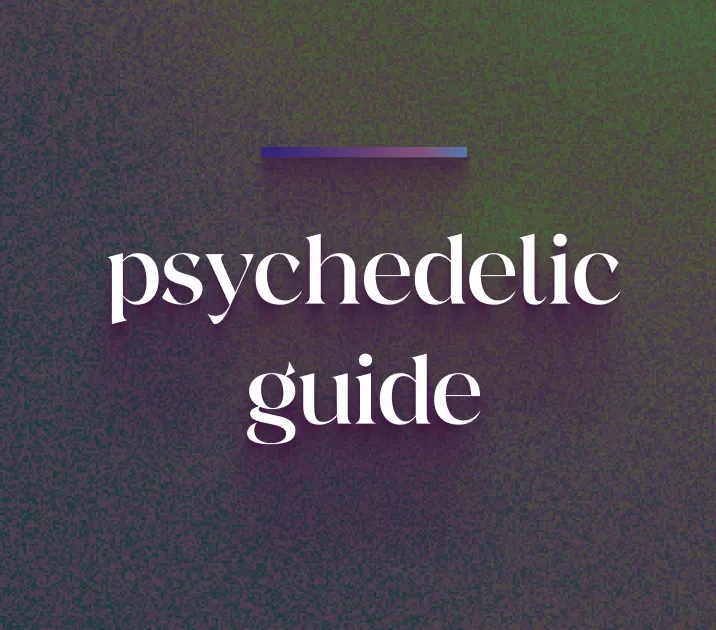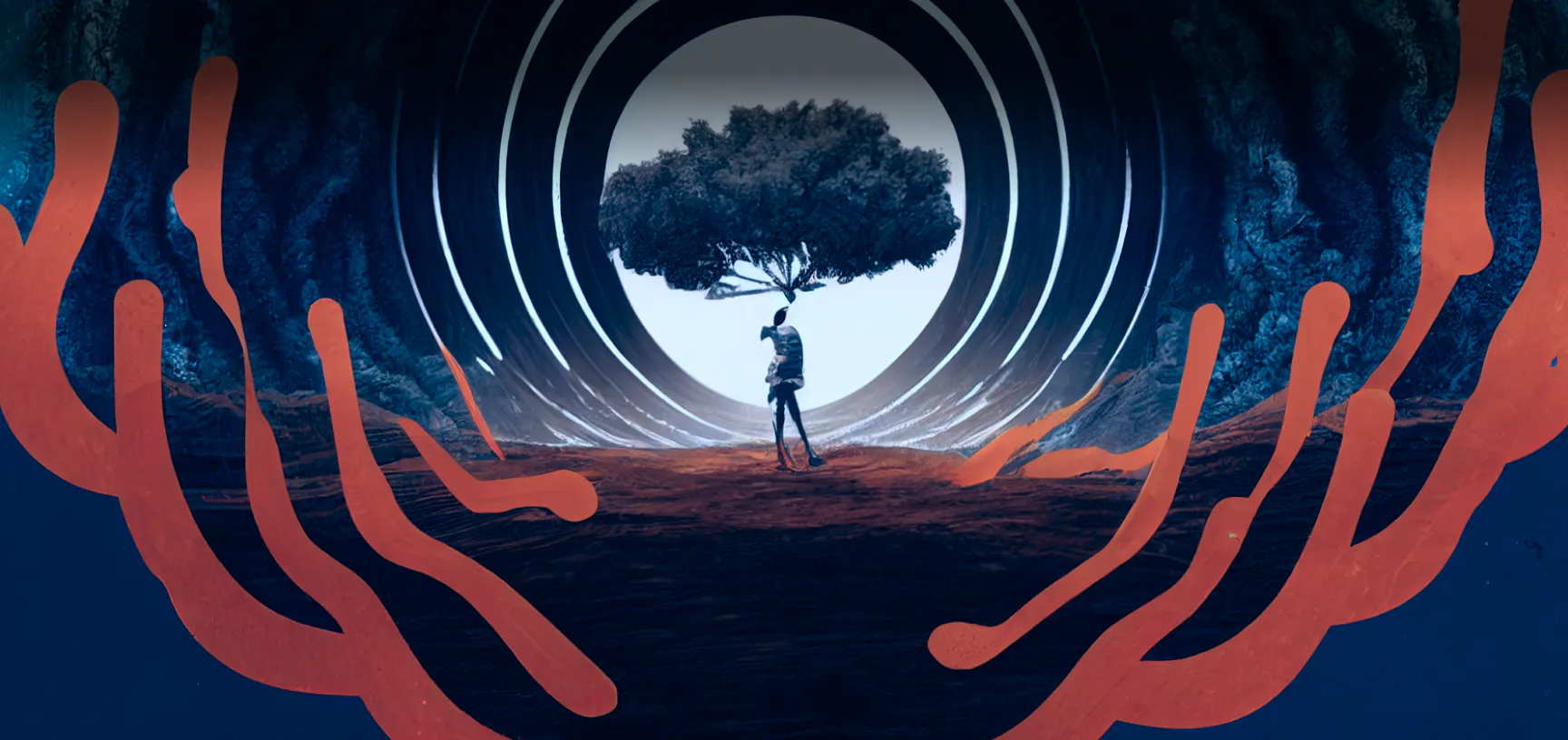In part one of our Psychedelic Law series, we examined the human cost of psychedelic prohibition in the U.K., and in part two of the series, we examined the realities of Canada’s right-to-try laws and how some patients seeking psychedelic therapy were being left behind. In part three, we move our focus to the often byzantine psychedelic regulations in the United States.
The U.S. – whether the rest of the planet likes it or not – still sets the tone for drug policies around the globe. As the nation responsible for the demonization of psychedelics in the first place, with Richard Nixon and his militant 1971 declaration of a “War on Drugs,” much of the world will follow wherever America goes.
So what is the influential nation doing to progress access to psychedelic therapies?
Depending on your point of view, the U.S. has some of the most considered and progressive measures in the world – or some of the most careless and irresponsible.
Keep Up with Psychedelic Trends
Don’t miss the latest psychedelic news, events, companies, and more.
We respect and protect your privacy. By subscribing your info will be subject to our privacy policy. Unsubscribe easily at any time
“My big picture perspective is that the U.S. is passing complicated states-based reforms that are genuinely far ahead of the rest of the world,” argues Joshua Kappel, a drug policy attorney and the founding partner of Vicente LLP, a leading cannabis and psychedelics firm in Denver. “The advantage of the ‘states rights’ model is it allows us to advance progressive drug policies on a state-by-state basis, see how things work out, and then adapt based on real-life experiences.”
Thanks to “state’s rights” and ballot initiatives, individual regions may set their own rules (often by popular vote). Nearly 100 cities and 11 states are tabling new regulations. America is now an eclectic and confusing patchwork of psychedelic laws that vary from state to state – often in surprising ways.
State Legislation and Scientific Consensus Conflict

The first state to table a bill for psychedelic regulation was Texas, not California or Vermont, as you might expect. The first president to approve legal psychedelic use was not Obama but Trump, who signed the “Right to Try” Act in 2018 for the terminally ill.
Moreover, regulations differ not only between states, but between cities within states. Seattle and Detroit, for example, have decriminalized psychedelics for recreational and medical use, yet psychedelics remain illegal in Michigan and Washington state.
Similarly, Oregon and Colorado have both moved to legalize mushrooms for therapeutic and medical use. Yet, the FDA still labels psilocybin as a Schedule One drug, meaning it is deemed to have no medical value.
“The biggest virtue of decriminalization is that it legitimizes and validates legal recreational use, an issue that has been side-lined by many of the groups campaigning for legal medical use.”
– Mason Marks
That Schedule One designation is the equivalent of a “regulatory black hole,” says Mason Marks, a law professor who leads the Project on Psychedelics Law and Regulation at Harvard Law School’s Petrie-Flom Center.
Keep Up with Psychedelic Trends
Don’t miss the latest psychedelic news, events, companies, and more.
We respect and protect your privacy. By subscribing your info will be subject to our privacy policy. Unsubscribe easily at any time
“Small amounts of anecdotal evidence became sufficient to banish substances to schedule one, and data from Phase II or III clinical trials are required to remove them,” he wrote in an Influential commentary published in Nature Medicine earlier this year.(1)
“This process was never going to be without growing pains – you can’t overturn 50 years of prohibition overnight,” says Marks.
Yet there are reasons for optimism, he says, and recent changes in cannabis regulations are instructive. Thanks to recent studies demonstrating the undeniable benefits of cannabis for epilepsy, the Drug Enforcement Administration (DEA) moved the CBD formulation Epidiolex from Schedule One straight to Schedule Five (the second to lowest category, which includes cough medicine with low amounts of codeine) in 2018 and de-scheduled it entirely in 2020.(2)
“The scheduling system is now poised to replicate the Epidiolex scenario for psychedelics,” says Marks, pointing to the National Institutes on Drug Abuse (NIDA) announcement in 2021 that it would fund studies to examine if psilocybin can help smokers quit, the first federally funded psychedelic study in more than 50 years.(3)
Could Marks be right? Might psilocybin soon rocket from contraband inebriant to mainstream medicament? Will American states lead the way?
“If they take away one of your rights, they can take away all of your rights. And this, [psychedelic medicine],” he says, “Should be a civil right.”
– Spencer Hawkswell
Voters in Oregon certainly think so: in 2020, 55.7% opted to legalize psilocybin for personal use under Measure 109, hoping to become the first American jurisdiction with full, government-sanctioned access to mushrooms. “Oregon legalizes psychedelic therapy,” media outlets worldwide declared.(4, 5)
But the truth is far less simple or exciting than headlines would have us believe.
“Strictly speaking, under the law in Oregon, psilocybin is not permitted to be used for medical or therapeutic use,” explains Marks.
“In Oregon, you are prohibited from making any health-related claims, diagnosing or treating any medical issues, stating that you can treat serious conditions such as treatment-resistant depression or OCD, or operating within a legitimate healthcare facility,” he elaborates. Those who dispense it may call themselves “facilitators,” but not “therapists.” He says that psilocybin has been placed into the same category as yoga or acupuncture – legal for exploration by healthy adults, but illegal as medication for those in serious need. The state has not legalized psychedelic therapy, he argues, but “supported adult use.”(6)
“Yet the false narrative that ‘Oregon has legalized psychedelic therapy’ has been so widely perpetuated, it has become almost a meme,” sighs Marks.
Other states tabling legal psychedelic therapy are attempting to “learn from Oregon’s mistakes,” says Marks, such as Colorado with Proposition 122, the “Decriminalization, Regulated Distribution, and Therapy Program for Certain Hallucinogenic Plants and Fungi Initiative,” passed in November 2022. This attempts to set a framework for legal recreational use and regulated medical treatments through manufacturing licenses.(6)
“But it’s very difficult for legislators to wrap their head around the concept that something can be both regulated and unregulated,” says Marks. Plus, new amendments introduced to the bill by Senator Fenberg have added “unnecessary complexity and potential for confusion.”(7)
Without decades of experience in the American court system, the hodge-podge of new and nebulous regulations is indeed confusing. The universal fear is this: that the reckless sale of psilocybin to vulnerable individuals – self-harming teenagers and suicidal new mothers – could lead to tragic outcomes, a poster child, and another backlash.
“We don’t want this entire political shift to go crazy and wind up with people dead due to the irresponsible use of psychedelics,” says Ethan Nadelmann, Founder and former & Former Executive Director (2000-2017) of the Drug Policy Alliance, who has campaigned to legalize marijuana since the 1970s. For decades, he has had a front-row seat for the “rapid evolution” of public attitudes, as he puts it.
“When something [psychedelics] is exploding like this, it’s inevitably going to be chaotic and crazy – and the first steps are inevitably going to be confused and problematic,” he says. “I cannot imagine that Oregon was ever going to go well. Yes, it was a mess, but it was always going to be a mess. This kind of evolution is part of the whole process.”
Psychedelic Decriminalization Doesn’t Go Far Enough
Is decriminalization – a “half measure,” as Nadelmann puts it – the answer?

Everyone has an opinion on the matter: Cheap, quick, and simple, it seems like a no-brainer for the dying and the desperate. “The biggest virtue of decriminalization is that it legitimizes and validates legal recreational use, an issue that has been side-lined by many of the groups campaigning for legal medical use,” says Marks.
Kappel – one of the authors of Colorado’s Proposition 122 – argues that while we wait for national attitudes to shift, states’ rights are the only way forward. “It’s easier to work with issues at a local level rather than try to move the gridlock machinery of the US Congress to change things federally,” he says.
However, lawyer Roger Murry, Senior Policy Advisor with Akin Gump, a legal firm that campaigns for the needs of veterans, says it is “irresponsible” to bring forward measures at a state level without federal approval.
“There simply is not enough publicly available clinical evidence that any of these compounds are safe and effective – so at the state level, the new measures are simply way outpacing the science,” says Murry. “Yes, there is a crisis of urgency – which means we need to scale up the resources for this and provide as much clinical evidence as quickly as possible.”
And the best way to achieve that, he says, is federal funding for clinical studies.
“At the federal level, there is a huge gap in research – so if we’re not doing that first, then things are out of order,” he argues. “The research on psilocybin is compelling, and it’s good work, but I think it’s incomplete. And the range of research being conducted on the whole range of naturally occurring compounds is even thinner. So how can any of these states feel they have enough information to move forward?”
With a national research program, he says, it would be far easier to deliver therapy to those who are desperate people and answer key questions, such as the amount of psychotherapy required before and after dosing. Eight hours of medical supervision is expensive. If this is required for every patient, that will dramatically increase costs.
“This is an incredibly important question for scaling this up: what is the right amount of therapy?” says Murry. “If we could show that these treatments are safe and effective, and we could scale them up nationally to treat thousands of people, wouldn’t that be remarkable? But we won’t get there without the highest quality research that produces durable results – and for that, we need federal funding.”
In Canada – where there is supposedly a humane and sane avenue for the terminally ill – Spencer Hawkswell of Therapsil is seething with rage at decriminalization moves in Vancouver.
“I can walk down the street and purchase cocaine, heroin, meth, or fentanyl, and at the most, I’ll be asked to go to a designated drugs space. But if I want psilocybin for an addiction or end-of-life distress, that is still illegal,” he fumes. “Our government either does nothing or opens everything right up. There is no common sense middle ground that even remotely resembles decent regulations with safe medicines, which is what people are asking for. It’s just absolute foolishness to spotlight something without providing a safe supply.”
Decriminalization is inadequate in many cases.
“A petty decriminalization solution is only going to harm more people with unsafe products. We don’t need decriminalization, we don’t need a free-for-all, and we don’t need a band-aid solution,” he says. “Policy is like paper – it can be ripped up and erased in an instant.”
Which is why there is only one solution to this issue: constitutional change, says Hawkswell.
“If they take away one of your rights, they can take away all of your rights. And this, [psychedelic medicine],” he says, “should be a civil right.”
As the U.S. continues to navigate the complex landscape of psychedelic laws, a balance between states’ rights, civil liberties, and scientific understanding becomes ever more crucial. The patchwork of regulations across states reflects a nation in flux, grappling with the legacy of prohibition and the potential of psychedelics as therapeutic tools. While some states stride boldly forward, embracing the possibilities of psychedelics in therapy, others remain cautious, highlighting the need for more comprehensive research and federal guidance.
This evolving narrative underscores a broader conversation about drug policy, civil liberties, and the role of states in shaping the future of psychedelic medicine. As America’s approach to psychedelic law continues to evolve, it becomes a barometer for global drug policy, signaling a gradual shift from stigma to acceptance, from prohibition to a nuanced understanding of psychedelics’ place in society and healthcare.
In our fourth and final issue of the Psychedelic Law series, we will examine Australia’s recent psychedelic legalization efforts and how things may not be what they seem in the land down under.
Sources

1. Marks, M., & Shachar, C. (2023). Drug scheduling limits access to essential medicines and should be reformed. Nature Medicine, 29(2), 294–297. https://doi.org/10.1038/s41591-022-02169-4
2. Cormier, Z. (2020, December 1). Psilocybin treatment for mental health gets a legal framework. Scientific American. https://www.scientificamerican.com/article/psilocybin-treatment-for-mental-health-gets-legal-framework/
3. Hair, C. (n.d.). Oregon Has Legalized Psilocybin Therapy—So When Can I Take Magic Mushrooms? Portland Mercury. https://www.portlandmercury.com/cannabisguide2022/2022/04/18/40476978/oregon-has-legalized-psilocybin-therapy-so-when-can-i-take-magic-mushrooms
4. Marks, M. (n.d.). Oregon Legalized Supported Adult Use of Psilocybin, Not Psychedelic Assisted Therapy. Www.psychedelicweek.com. https://www.psychedelicweek.com/p/oregon-psilocybin-therapy-training-medical-fda
5. Akin, an Elite Global Law Firm. (n.d.). Akin Gump Strauss Hauer & Feld LLP – Roger P. Murry. Retrieved November 27, 2023, from https://www.akingump.com/en/lawyers-advisors/roger-p-murry
6. Colorado Proposition 122, Decriminalization and Regulated Access Program for Certain Psychedelic Plants and Fungi Initiative (2022) – Ballotpedia. (n.d.). Ballotpedia. https://ballotpedia.org/Colorado_Proposition_122,_Decriminalization_and_Regulated_Access_Progr
This material is not intended as a replacement or substitute for any legal or medical advice. Always consult a medical professional about your health needs. Psychedelics are widely illegal in the United States, and readers should always be informed about local, state, and federal regulations regarding psychedelics or other drugs.

 Zoe Cormier
Zoe Cormier




 David Connell
David Connell
